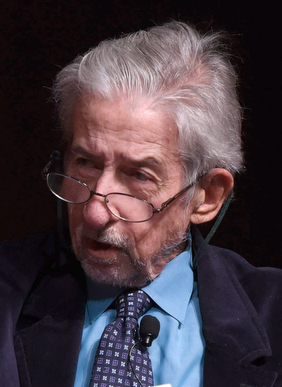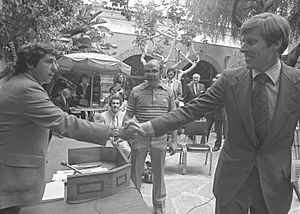Tom Hayden facts for kids
Quick facts for kids
Tom Hayden
|
|
|---|---|
 |
|
| Member of the California Senate from the 23rd district |
|
| In office December 7, 1992 – November 30, 2000 |
|
| Preceded by | Herschel Rosenthal |
| Succeeded by | Sheila Kuehl |
| Member of the California State Assembly from the 44th district |
|
| In office December 6, 1982 – November 30, 1992 |
|
| Preceded by | Mel Levine |
| Succeeded by | Bill Hoge |
| Personal details | |
| Born |
Thomas Emmet Hayden
December 11, 1939 Royal Oak, Michigan, U.S. |
| Died | October 23, 2016 (aged 76) Santa Monica, California, U.S. |
| Political party | Democratic |
| Spouses |
Barbara Williams
(m. 1993) |
| Children | 2; including Troy Garity |
| Education | University of Michigan (BA) |
Thomas Emmet Hayden (December 11, 1939 – October 23, 2016) was an American activist, writer, and politician. He was well-known for his work in the 1960s. He supported civil rights and protested against wars.
Hayden wrote an important document called the Port Huron Statement. He was also part of a famous court case known as the Chicago Seven. Later in his life, he became a politician. He won elections to serve in both the California Assembly and the California Senate. He was married to actress Jane Fonda for 17 years. He was also the father of actor Troy Garity.
Contents
Early Life and Activism
Thomas Emmet Hayden was born in Royal Oak, Michigan. His parents were Genevieve Isabelle and John Francis Hayden. His father was a former Marine who worked as an accountant. When Tom was 10, his parents divorced. His mother raised him.
Hayden went to a Catholic elementary school. He grew up attending a church led by Charles Coughlin. Coughlin was a Catholic priest known for his controversial teachings. Hayden disagreed with Coughlin's views. This led him to leave the Catholic Church as a teenager.
Hayden attended Dondero High School in Royal Oak. He was the editor of the school newspaper. In his last column, he spelled out a hidden message. Because of this, he was not allowed to attend his graduation ceremony. He still received his diploma.
Hayden then went to the University of Michigan. There, he was the editor of the Michigan Daily newspaper. In 1960, he met Sandra Cason at a student convention. She spoke strongly against racial segregation. Tom Hayden was inspired by her words. He soon joined a group called the Students for a Democratic Society (SDS). He and Sandra married in 1961.
Hayden became a "Freedom Rider." These activists rode buses into segregated areas to protest unfair laws. In December 1961, Hayden was arrested during a ride in Albany, Georgia. While in prison, he started writing the SDS manifesto.
The Port Huron Vision and SDS
The document Hayden started writing became the Port Huron Statement. It was adopted by the Students for Democratic Society (SDS]] in June 1962. The statement called for a "new left" movement. It focused on "participatory democracy." This meant people should have a direct say in decisions.
Tom Hayden was elected president of SDS for 1962–1963. His wife, Sandra Cason "Casey" Hayden, left him to work with the Student Nonviolent Coordinating Committee (SNCC). She felt SNCC focused more on action. The Haydens divorced in 1965.
Hayden believed students should help with struggles for justice. He started the Economic Research and Action Project (ERAP). This project aimed to help poor white neighborhoods. By 1964, ERAP had many projects. It involved 125 student volunteers.
Hayden worked for three years in Newark, New Jersey. He helped poor Black residents organize against bad landlords. He saw the 1967 Newark Riots. He wrote a book, Rebellion in Newark (1967), about the riots. His work in Newark caught the attention of the FBI.
Hayden later suggested that ERAP didn't grow bigger because of the Vietnam War. He felt the government started an "external crisis" to deal with problems at home.
Anti-War Activist
In 1965, Hayden visited North Vietnam. He went with Herbert Aptheker and Staughton Lynd. They toured villages and factories. They also met an American prisoner of war. Their trip resulted in a book called The Other Side.
In 1968, Hayden joined the National Mobilization Committee to End the War in Vietnam. He played a big part in protests during the 1968 Democratic National Convention in Chicago. Police broke up the demonstrations. A U.S. commission later called it a "police riot."
Hayden and seven other protesters were charged with conspiracy. They were called the "Chicago Eight." Later, they became the "Chicago Seven." Hayden and four others were found guilty of crossing state lines to cause a riot. However, these convictions were later overturned. The government decided not to retry the case.
Hayden made more visits to North Vietnam and Cambodia. These trips happened during the Vietnam War. In 1973, he married actress Jane Fonda. They had a son, Troy Garity, born in July 1973. In 1974, they released a documentary film. It was called Introduction to the Enemy. It showed their travels through Vietnam.
Hayden also started the Indochina Peace Campaign (IPC). This group worked from 1972 to 1975. It protested the Vietnam War. It also asked for forgiveness for U.S. draft evaders. Jane Fonda supported the IPC. She later named her film company, IPC Films, after it. Hayden and Fonda divorced in 1990.
New Left Legacy
Many people recognized Tom Hayden's impact. Nicholas Lemann said Hayden "changed America." He called him the "father to the largest mass protests in American history." Richard N. Goodwin, a speechwriter for presidents, said Hayden inspired the "Great Society."
Hayden's FBI files showed he met with some unexpected people. He developed a friendship with Senator Robert Kennedy. Hayden was even a pallbearer at Kennedy's funeral.
Career in Politics

In 1976, Hayden ran for U.S. Senator in California. He said, "The radicalism of the 1960s is fast becoming the common sense of the 1970s." He started far behind but came in a close second. He and Jane Fonda then started the Campaign for Economic Democracy (CED). This group worked with Governor Jerry Brown. They promoted solar energy, protecting the environment, and renters' rights.
Hayden served in the California State Assembly from 1982 to 1992. Then he served in the State Senate from 1992 to 2000. During this time, some conservative groups protested him. These included Vietnamese refugees and military veterans.
In 1994, he ran for Governor of California. He focused on changing how political campaigns are funded. In 1997, he ran for Mayor of Los Angeles. He lost to the current mayor, Richard Riordan.
As a member of the State Assembly, Hayden introduced a bill. This bill allowed colleges to charge "student representation fees." These fees help student organizations. They allow students to share their views with government officials.
In 1999, Hayden gave a speech at the Seattle WTO protests. In 2001, he ran for the Los Angeles City Council but did not win. Hayden was on the advisory board for the Progressive Democrats of America. This group works to increase progressive influence in the Democratic Party.
Hayden was also known for supporting animal rights in California. He wrote a bill called the Hayden Act. This law improved protection for pets. It also extended how long shelters could hold stray animals.
In 2016, Hayden ran to be a representative for California at the Democratic National Committee. He supported Bernie Sanders at first. Later, he announced he would support Hillary Clinton. He said he hoped Sanders' campaign would push Clinton's policies to be more progressive.
Hayden said he remained a "radical" throughout his life. He saw himself as someone who believed in democracy and protecting the environment.
Academic Career and Writings
Hayden was a teaching assistant at the University of Michigan in the 1960s. He taught courses on social movements. He taught at Scripps College, Pitzer College, Occidental College, and Harvard University. He also taught a class at University of California, Los Angeles.
Hayden wrote or edited 19 books. These include The Long Sixties: From 1960 to Barack Obama and his memoir, Reunion. He was also on the editorial board of The Nation magazine. His last book, Hell No: The Forgotten Power of the Vietnam Peace Movement, was published in 2017.
In 2007, Hayden released Ending the War in Iraq. In this book, he argued that the U.S. should withdraw from Iraq. He believed that military occupation would not lead to peace or development.
Personal Life
Tom Hayden was married to actress and activist Jane Fonda for 17 years. They had a son, Troy Garity. Hayden lived in Los Angeles starting in 1971. He was married to his third wife, Barbara Williams, when he passed away. They adopted a son together.
Hayden died in a hospital in Santa Monica, California, on October 23, 2016. He was 76 years old. His wife, Barbara Williams, said he had heart problems. His health had been getting worse in the months before his death. He was buried in Woodlawn Memorial Cemetery, Santa Monica. Former U.S. President Bill Clinton spoke about him. He said he and Hillary Clinton valued Hayden's support and criticism.
Popular Culture
- Brian Benben played Hayden in the 1987 film Conspiracy: The Trial of the Chicago 8.
- Troy Garity, Hayden's son, played his father in the 2000 film Steal This Movie!.
- Hayden was voiced by Reg Rogers in the 2007 animated documentary Chicago 10.
- David Julian Hirsh played Hayden in the 2010 film The Chicago 8.
- Hayden was played by Eddie Redmayne in the 2020 drama film The Trial of the Chicago 7.
Works
- The Port Huron Statement (1962)
- The Other Side (1966)
- Rebellion in Newark: Official Violence and Ghetto Response (1967)
- Trial (1970)
- The Love of Possession Is a Disease with Them (1972)
- Vietnam: The Struggle for Peace, 1972–73 (1973)
- The American Future: New Visions Beyond Old Frontiers (1980)
- Reunion: A Memoir (1988)
- The Lost Gospel of the Earth: A Call for Renewing Nature, Spirit and Politics (1996)
- Irish Hunger (1997)
- Irish on the Inside: In Search of the Soul of Irish America (2001)
- The Zapatista Reader (Introduction, 2001)
- Rebel: A Personal History of the 1960s (2003)
- Street Wars: Gangs and the Future of Violence (2004)
- Radical Nomad: C. Wright Mills and His Times (2006)
- Ending the War in Iraq (2007)
- Writings for a Democratic Society: The Tom Hayden Reader (2008)
- Voices of the Chicago 8: A Generation on Trial (2008)
- The Long Sixties: From 1960 to Barack Obama (2009)
- Bring on the Iraq Syndrome: Tom Hayden in Conversation with Theodore Hamm (2007)
- Listen, Yankee!: Why Cuba Matters (2015)
- Hell No: The Forgotten Power of the Vietnam Peace Movement (2017)
See also
 In Spanish: Tom Hayden para niños
In Spanish: Tom Hayden para niños
- List of peace activists

